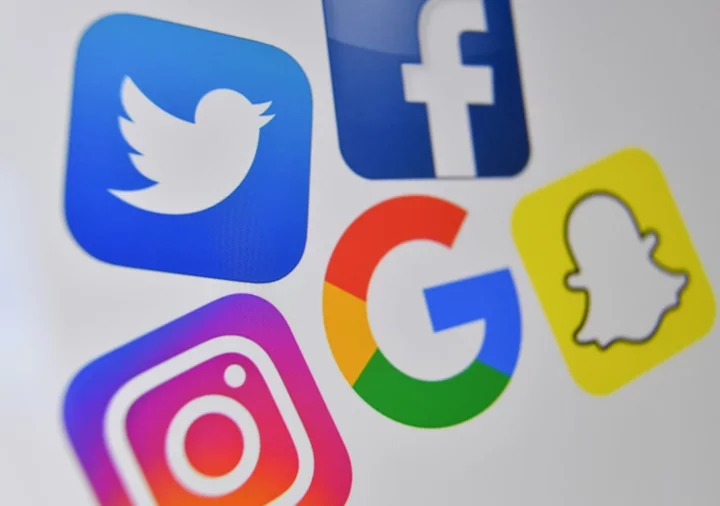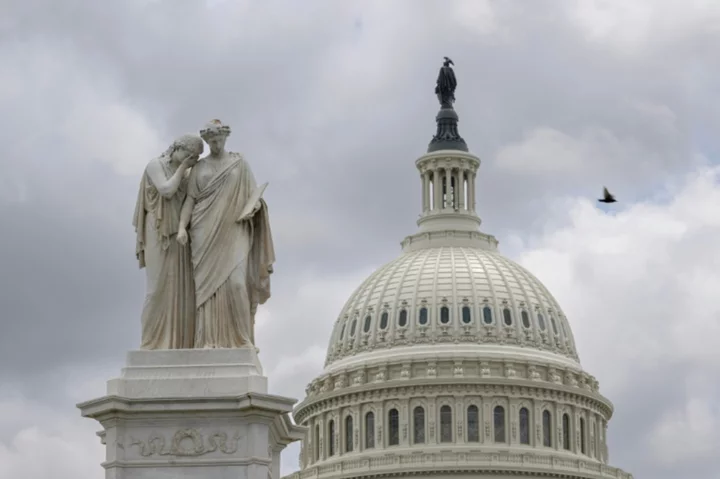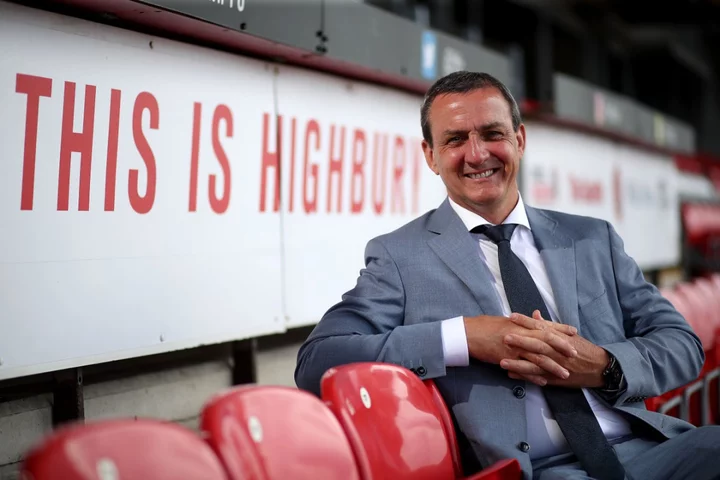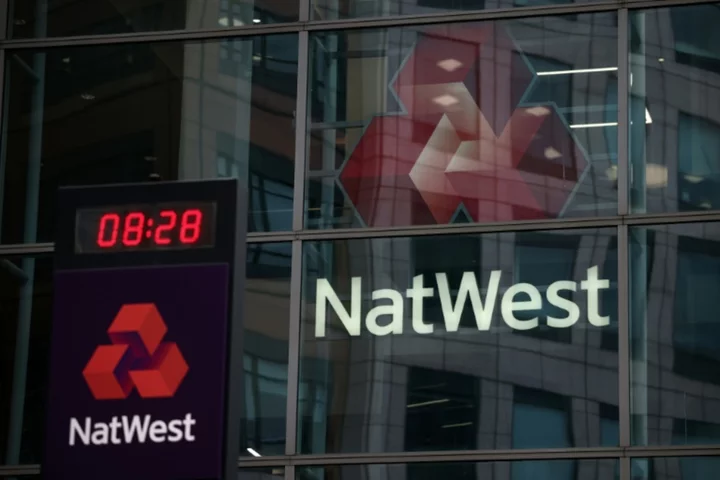
Study trips, livestreamed fish: Japan's Fukushima charm campaign
From livestreamed fish to diplomatic study trips, Japan is waging a concerted campaign to calm controversy before it begins releasing treated water from the Fukushima...
2023-07-05 11:57

US court limits officials' contacts with social media firms
A US federal court on Tuesday restricted some top officials and agencies of President Joe Biden's administration from meeting and communicating with social media companies to moderate their content, a ruling that could...
2023-07-05 10:52

Asian markets drop as China data indicates further weakness
Asian markets sank Wednesday as another round of data showed China's economy continued to struggle in June, with little hope that the country's leaders can unveil the...
2023-07-05 10:51

Disinformation researchers lament 'chilling' US legal campaign
The study of disinformation has emerged as a political lightning rod in the United States, with conservative advocates launching a sweeping legal offensive that researchers fighting falsehoods denounce as an...
2023-07-05 09:49

Jake Paul gambling advert banned by watchdog as YouTuber has 'strong appeal to under-18s'
Jake Paul is arguably one of the most well-known influencers in the world right now, but unfortunately for gambling firm Ladbrokes, the YouTuber-turned-boxer’s widespread appeal has landed them in a bit of trouble with the UK’s Advertising Standards Authority (ASA). The independent advertising watchdog, which regulates the advertising industry, enforces rules drawn up by the Committee of Advertising Practice (CAP), which has some pretty strict rules when it comes to gambling ads. In addition to requiring said adverts to be “socially responsible” and “protect children … from being harmed or exploited”, the CAP’s code states marketing communications must not be “likely to be of strong appeal to children or young persons, especially by reflecting or being associated with youth culture”. “They must not include a person or character whose example is likely to be followed by those aged under 18 years or who has a strong appeal to those aged under 18,” it reads. After Ladbrokes shared a promoted tweet in February featuring Paul – following his defeat to Tommy Fury – in which Twitter users were encouraged to vote on “what’s next for Jake Paul”, a single complaint was made to the ASA as to whether it may be in breach of the Code. Responding to the ASA’s enquiries, the betting company noted the advert contained no calls to action, promotions or links back to its website – and was “age-gated” so only users who had confirmed their age as being over 18 could see it. Sign up to our free Indy100 weekly newsletter The ad was specifically targeted at users aged 25 and over, receiving close to 16,500 impressions with just over 47 per cent of these being from individuals aged between 20 and 29 years. Ladbrokes also cited demographics for Paul’s following across several social media platforms, showing that the percentage of users aged between 13 and 17 years old was below 20 per cent on Instagram, YouTube and TikTok. On Twitter, zero per cent of his followers were reportedly registered as being under 18. The company also directed ASA to the watchdog’s own guidance on “protecting under-18s” from advertising about gambling and lotteries, in which it states “sports like … boxing … are more adult-oriented and unlikely to be of inherent ‘strong’ appeal” to children and young people. Zing. However, in a decision which saw the regulator uphold the complaint against Ladbrokes, the ASA ruled there was still a responsibility to comply with the rule about not appealing to under-18s because the advert “appeared in a medium where under-18s could not be entirely excluded from the audience”. It continued: “CAP guidance stated that sportspeople involved in clearly adult-oriented sports who were ‘notable’ stars with significant social media and general profiles which made them well-known to under-18s were considered moderate risk in terms of how likely they were to be of strong appeal to under-18s. “We also considered that Jake Paul would primarily be known for making YouTube videos and that he had a large social media following. We acknowledged that he had within the last few years turned to boxing. “However, because of his career on YouTube, we considered that he had a high profile within the sport and was well known outside of the sport and social media.” Although they noted Paul had no followers aged under 18 on Twitter, where the ad was located, the ASA concluded the content creator was still of “inherent strong appeal” to under-18s because “such large numbers” of his followers were in that demographic. They also mentioned Paul’s appearance on the Disney Channel series Bizaardvark between 2016 and 2018 about two teenagers, with the target audience for the show likely to be “around the same age”. As such, they found Paul still had a “strong appeal” to under-18s and that Ladbroke’s advert was “irresponsible”. Not the first time Paul and “irresponsible” have appeared in the same sentence, to be honest… Have your say in our news democracy. Click the upvote icon at the top of the page to help raise this article through the indy100 rankings.
2023-07-05 07:29

Exclusive-Insurers look to ease UN climate alliance rules after member exodus - sources
By Tommy Wilkes LONDON (Reuters) -The remaining insurers in a United Nations-backed coalition aimed at tackling climate change are poised
2023-07-05 02:19

Argentina, Brazil take aim at EU's environmental trade deal conditions
Argentina and Brazil, South America's largest economies, took aim Tuesday at an "unacceptable" EU stance in negotiations with the Mercosur bloc for a free trade deal long delayed...
2023-07-05 01:57

Minimum wage workers in these states and localities just got a raise
Lots of low-wage workers just received a boost in pay, as more than a dozen states and localities increased their minimum wages.
2023-07-05 01:54

Business as usual for Fleetwood as former chairman is jailed
Fleetwood will continue to go about the club’s normal business following the sentencing of former chairman Andy Pilley. Pilley, who stepped down as chairman and director of the League One club during May after being convicted on four counts of fraud, appeared at Preston Crown Court for sentencing on Tuesday. He was found guilty of two counts of fraudulent trading, fraud by false representation and being involved in the acquisition, retention, use or control of the proceeds of fraudulently mis-sold energy contracts. Also chairman of BES Utilities, Pilley had been involved in High Court litigation with Cheshire West and Chester Council, but lost a civil court fight over investigating allegations of mis-selling. At the Crown Court sentencing, the 53-year-old, who had been was remanded in custody, was jailed for a total of 13 years and was also disqualified from being a director for 13 years. Pilley had been the chairman and owner of Fleetwood for 20 years and overseen the club’s rise from non-league status to the English Football League. Fleetwood, who finished 13th last season, had already announced the club were in discussions surrounding a change of ownership and control which remain ongoing. A statement on Tuesday afternoon read: “Fleetwood Town Football Club acknowledges the sentencing in the court case involving former club chairman, Andy Pilley. “The club would like to reiterate convictions are against individuals and not Fleetwood Town FC, or any of the businesses associated with them, and will continue to operate as normal. “Fleetwood Town remain in communication with the EFL and will be making no further comment at this time.” Read More Charity boss speaks out over ‘traumatic’ encounter with royal aide Ukraine war’s heaviest fight rages in east - follow live
2023-07-05 00:49

We may be underestimating the climate risk to crops: researchers
The risks of harvest failures in multiple global breadbaskets have been underestimated, according to a study Tuesday that researchers said should be a "wake up call" about the threat climate...
2023-07-04 23:21

‘Rate limits’ and Twitter chaos: What exactly is Elon Musk doing?
Twitter has been plunged into chaos in recent days, amid new “rate limits” and rules that actually stop people from using the site. The changes have been dramatic enough that they have led to speculation that they could be the thing to finally doom Elon Musk’s takeover of the social network. What are the ‘rate limits’? It is a somewhat technical term for a complex process that has a simple effect: users are rationed on how many tweets they can see. If people and the apps they use make too many requests too often – in this case for tweets – then the service will stop providing them. On Twitter, the new rate limits are different depending on what kind of user is on: someone who pays for the premium “Twitter Blue” service will get more than a normal user, for instance. They are also changing all the time, with the limit being increased recently. Twitter has long had rate limits, which ensure that malicious actors cannot send huge number of requests to the site and bring it down, for instance. But they would previously only have been hit by people using specific tools, since they were much higher. What happens when you hit the limit? Users will see a warning telling them they have received the rate limit. The site will then stop working properly, because it will refuse to load any more tweets. Why has it happened? The official explanation is that Elon Musk is concerned about how many artificial intelligence companies are scraping posts from Twitter in order to feed to their systems and teach them more about how to use language. In an attempt to stop that, Mr Musk placed the limits to make it harder for that scraping to happen. But there is no proof that is actually the case. The problems at Twitter may well be infrastructural issues caused by the site’s engineering, and its lack of staff, that have made it incapable of serving normal requests. Or it might be a mix of the two. There is no doubt that the site is being scraped, but rate limits of this kind are an unusual way of responding to it, and other sites that are being scraped have not needed to do the same thing. Are there other changes? The other major change instituted recently by Elon Musk is to ban people who are not signed into the site from seeing posts. This is ostensibly for the same reason, since it means that scrapers cannot just gather up posts from the site from the outside. It already means that some things about Twitter are not working as they used to. If someone sends a tweet within a messaging app, for instance, then the posts’ preview won’t show, since the app cannot access the tweet. Will this change how people use Twitter? Almost certainly. Much of Twitter’s value lies in its high-profile and high-commitment users: the celebrities, organisations and big brands who use it to post, and the engaged users who follow them. That is much of what sustains its place in culture, even as it gets fewer users than much bigger social networks such as Facebook. The recent changes have directly antagonised those users. Big organisations cannot rely on tweets as a way for anyone to see what they’re posting, since users have to be logged in; engaged users cannot rely on being able to use the platform, since they are set to be rate limited. What’s more, the recent changes could cause problems for advertisers, given how important it is for users to stay engaged and see their posts. Companies are already using Twitter less for advertising, as a result of other controversies, and that may just continue. Is this the end? Some people have been predicting an end to Twitter since long before Elon Musk took it over; when he did, those predictions got louder and more regular, but they have still been largely wrong. It appears that no matter what Mr Musk does, people keep logging on and using the site. That might well be largely due to network effects: the idea that the value really comes from the number of people using the platform, which also makes it very difficult to create a new one. People might be unhappy on Twitter, but the network effect means they might feel lonely or that they are missing out if they move elsewhere. But all of that doesn’t mean that this time around won’t be the end. Certainly the latest problems have the most obviously problematic effect, of forcing Twitter’s most engaged users to not use the app, which might finally encourage them to go elsewhere. In the end, the discussion is often based on the idea that there will be some big moment that causes everyone to leave Twitter, or for the app to die. In fact, social networks have tended to decline slowly before they are finally shut down; something that might already be happening on Twitter. What are the alternatives to Twitter? Again, people have been trying to replace Twitter for years, for reasons including everything from protests against its content management rules to opposition to its centralised nature. Attempts to create a new Twitter have only increased since Elon Musk took over the original one. But they have almost always failed to take off. Network effects and the relative maturity of Twitter as a platform mean that they have always faced a challenge, and never really met it. As such there are a number of alternatives to Twitter. Notable among them are Mastodon, which is decentralised and has become perhaps the most discussed new alternative, and Bluesky, an effort to build a new kind of Twitter that originally began with the company. But the most promising alternative might be about to launch. Meta is launching Threads this week, an app linked to Instagram that aims to allow people to post text updates that might have the might to actually take over from Twitter. What is happening to TweetDeck? TweetDeck also went down along with Twitter over the weekend. It’s unclear how the two are connected, though they happened at the same time. Now Twitter has announced that TweetDeck is coming back. But it comes with some changes, and the most notable of them is that people will have to pay for Twitter Blue to get access to it. Read More Twitter to stop TweetDeck access for unverified users Meta’s Twitter alternative Threads to be launched this week How Elon Musk finally broke Twitter – and why it might just be the start Twitter rival Bluesky halts sign-ups after huge surge in demand Twitter is breaking more and more Twitter rival sees huge increase in users as Elon Musk ‘destroys his site’
2023-07-04 23:20

Carbon 'capture' climate tech is booming, and confusing
Humanity's failure to draw down planet-heating carbon dioxide emissions -- 41 billion tonnes in 2022 -- has thrust once-marginal options for capping or reducing CO2 in the atmosphere to centre...
2023-07-04 22:19
You Might Like...

Daryl Hall is suing John Oates over plan to sell stake in joint venture. A judge has paused the sale

Why are far-right parties on the march across Europe?

Philips stock slumps after new FDA warning

Crisis-hit NatWest bank launches review into Farage case

Alia Bhatt, Deepika Padukone: When Bollywood A-listers turn into start-up stars

High costs push home ownership out of reach of younger Americans

Engine maker Rolls-Royce to axe up to 2,500 jobs

Broadcom wins conditional EU antitrust approval to buy VMware
